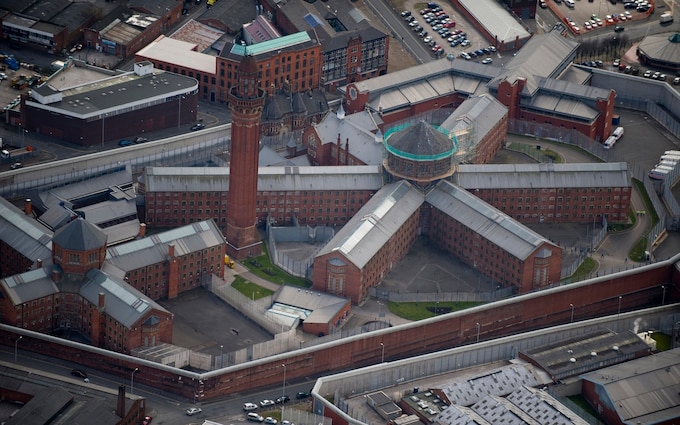
HMP Manchester,the scene of Britain's longest prison riot,which lasted for 25 days in 1990
Credit: Jason Hawkes/Getty
Overcrowding has put jails at risk of a repeat of the Strangeways riot,prison governors have warned.
Tom Wheatley,president of the Prison Governors’ Association,said some of the same “precursors” to Strangeways are in place now,with jails just six weeks away from running out of space.
The 1990 riot at Strangeways Prison,now HMP Manchester,was the longest disturbance in British penal history,lasting 25 days.
One prisoner was killed,147 officers and 47 inmates were injured and much of the prison was destroyed or damaged,at a cost of £55 million.
Asked if there could be a repeat of the riot,Mr Wheatley,a former governor at HMPs Long Lartin,Nottingham and Wakefield,said: “I really sincerely hope not but some of the precursors of the Strangeways riot are in place again. Some of the factors that led to it are there.
“What we don’t have at the moment is the capacity that we would need [to decant prisoners] if we had a disturbance on the scale of Strangeways. I genuinely hope not but it’s a hope rather than being safe in the knowledge that it won’t happen.”
The early-release scheme for prisoners was extended to 70 days at the end of last week,but Mr Wheatley warned it would only provide a “very brief respite” before jails ran out of space in around six weeks,at the time of the general election on July 4.
He said prisons were a “tinderbox” because overcrowding fuels violence and drug use,and creates instability when prisoners are moved around because of the shortage of spaces.
Mr Wheatley said: “We are quite near to complete chaos at the moment. We are operating in a system that is running under significant pressure.
“We have been through times before when the population pressure was difficult to manage but I cannot remember such sustained pressure for as long a period of time.”
The scheme is being used by governors at more than a dozen of the most overcrowded prisons.
The only alternative will be to introduce legislation to bring forward the release of offenders on determinate sentences from half-way through their terms,to 40 per cent or thereabouts,said Mr Wheatley.
It is understood a move to release prisoners 43 per cent of the way through their sentences is currently being considered by No 10 and the Ministry of Justice.
The move would bake earlier release dates into the criminal justice system,offering a medium-term solution to a crisis in which the number of spare places in male prisons has dipped below 300.
It would affect around 42,000 prisoners,those serving sentences shorter than four years.
Earlier release is seen as politically more palatable than proposals to scrap most jail sentences under 12 months and replace them with suspended prison terms.
However,the Sentencing Bill,instituting such changes,has been shelved in the wash-up of legislation after Rishi Sunak called a snap election.
Penal reformers said both measures would be needed to tackle the prisons crisis,amid growing calls for a Royal Commission on criminal justice,a 2019 Tory manifesto pledge that never happened.
Andy Cooke,HM chief inspector of police,said: “The police operate as part of a wider criminal justice system which is dysfunctional and defective. The parlous state of the wider system significantly hampers the police’s efficiency and effectiveness.
“In its 2019 manifesto,the Government pledged to establish the Royal Commission for the criminal justice system. If anything,the arguments in its favour are stronger now than they were then.”